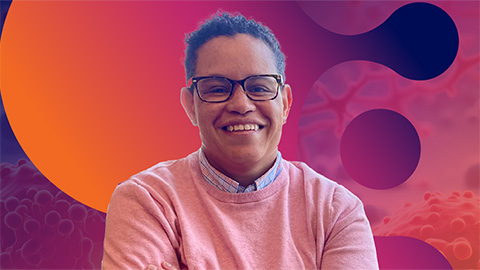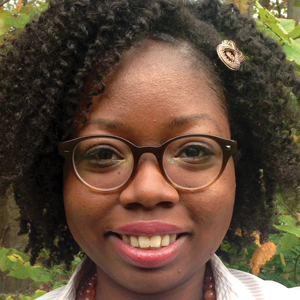'Keep developing your expertise'
Anand Balakrishnan talked to ASBMB Today about his work as principal scientist, specializing in biochemistry, at Enanta Pharmaceuticals Inc, a pharmaceutical company that focuses on antiviral drug discovery. Balakrishnan has been with the company for more than four years. This interview has been condensed and edited.

Current position: Principal scientist at Enanta Pharmaceuticals
Education: Ph.D. in chemistry from Rutgers University and postdoctoral fellowship in microbiology and immunology at Weill Cornell Medicine
First job outside of academia: Investigator II at Novartis Institutes for BioMedical Research
Favorite molecule or protein: "It’s actually this whole pathway of thiamine diphosphate biosynthesis, because it's very elegant chemistry and is important for all organisms."
What made you want to pursue an industry career?
During my postdoc work, I was working in infectious diseases — on Mycobacterium tuberculosis, which causes tuberculosis disease. A part of my project was working on drug discovery as there’s a lot of unmet medical need. I joined the infectious disease research group at Novartis, as I thought it was a good overlap of interest because my goal was to continue working in infectious diseases drug discovery.
What do you, as a principal scientist at Enanta, do?
I am a biochemist and enzymologist by training. I lead a biochemistry group supporting all the virology projects. For example, developing enzyme assays, doing biophysical studies, and structural biology. My group has been involved in studies on respiratory syncytial virus, SARS-CoV-2 and hepatitis B virus.
What does a typical day look like for you?
Usually my mornings are spent in meetings, mentoring group members or managing collaborations. I spend afternoons in the lab running experiments. We collaborate with biology and medicinal chemistry colleagues on a daily basis. As a biochemist, you get to learn a lot because you’re working across various diseases.
What are the top skills that have helped in your career?
I'm speaking as a drug-discovery biochemist. I think a strong understanding of the basics of chemistry and biology is important. Our role sometimes involves being translators between chemistry and biology, and we have to understand both languages. The ability to listen well to people, especially when you are part of a team where everybody is basically in a different field, is also needed.
My Ph.D. research was in enzymology. I gained in-depth expertise in the area and learned infectious disease drug discovery during my postdoc and in industry. So, from a career perspective, start in one area of science and keep developing your expertise. This your core strength. People will actually need you for that.
I think another important thing is realizing that biomedical research is really interconnected. So, while you develop your expertise in one area, keep an eye open to advances in other areas.
As you progress, I would say, writing, speaking and presentation skills also become important. You actually end up writing a lot, running project teams, and presenting data at internal and external meetings. So, whenever you get a chance, practice those skills.
What advice would you give someone who is interested in pursuing a similar career path?
It depends on what stage the person is in. Planning is the most important career advice. Know where your passion is, and develop a plan to make a career in that field.
Next, I would say networking — trying to learn more about your chosen field and trying to connect with people to learn about their career paths. Start early when you are in graduate school or when you’re about to graduate to address questions about your next step. "Do I want to go into industry? Which field? What are the companies working in that field? Which company attracts me more?"
Enjoy reading ASBMB Today?
Become a member to receive the print edition four times a year and the digital edition monthly.
Learn moreFeatured jobs
from the ASBMB career center
Get the latest from ASBMB Today
Enter your email address, and we’ll send you a weekly email with recent articles, interviews and more.
Latest in Careers
Careers highlights or most popular articles

Redefining lipid biology from droplets to ferroptosis
James Olzmann will receive the ASBMB Avanti Award in Lipids at the ASBMB Annual Meeting, March 7–10, just outside of Washington, D.C.

Creating change in biochemistry education
Pamela Mertz will receive the ASBMB William C. Rose Award for Exemplary Contributions to Education at the ASBMB Annual Meeting, March 7-10 in Washington, D.C.

Trainee mentorship as immortality
Suzanne Barbour will receive the ASBMB Sustained Leadership Award at the ASBMB Annual Meeting, March 7-10 in Washington, D.C.

Upcoming opportunities
Join us Feb. 5! The monthly ASBMB Transcription Webinars aim to facilitate knowledge exchange and collaboration among researchers in the fields of transcription, chromatin and epigenetics.

Life in four dimensions: When biology outpaces the brain
Nobel laureate Eric Betzig will discuss his research on information transfer in biology from proteins to organisms at the 2026 ASBMB Annual Meeting.

Redefining excellence to drive equity and innovation
Donita Brady will receive the ASBMB Ruth Kirschstein Award for Maximizing Access in Science at the ASBMB Annual Meeting, March 7–10, just outside of Washington, D.C.

